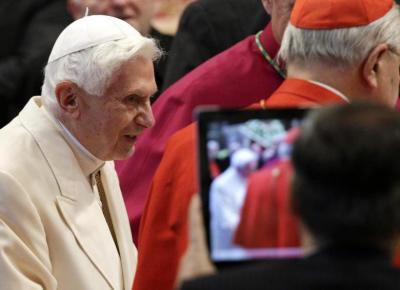No mercy without rules

Announcing the death of Benedict XVI on its Saturday front page, the New York Times drew a contrast between his papacy and that of his successor:
"The two men were reportedly on good terms personally, but it was at times an awkward arrangement, and Francis moved decisively to reshape the papacy, firing or demoting many of Benedict’s traditionalist appointees and elevating the virtue of mercy over rules that Benedict had spent decades refining and enforcing."
As a Protestant and (at best) an amateur observer of things Catholic, I cannot comment on the fairness of this analysis. What is interesting, however, is the way the language, in its contrast of mercy with rules, points to deeper issues within society as a whole, Catholic and Protestant, religious and secular. In fact, mercy is incoherent if there are no rules, rules that are rightly believed and applied. Only if there is a rule, and a just rule, can forgiveness for its transgression be seen as an act of mercy.
More pointedly for Christianity, underlying the comment is the notion that rules can neither be motivated by nor embody mercy in themselves. This is a common but dangerous idea that, if true, would prove lethal to the faith. It is also rather selectively applied today. Christianity makes it clear that human beings are designed to be a certain kind of creature. We are free and self-determining in a way that other creatures are not: The swallow instinctively builds a nest but we design houses freely and intentionally. Our freedom, however, operates within certain parameters as set by the limits of human nature. I cannot jump off the Empire State Building and fly, for example, or dive into a cauldron of boiling oil and expect to emerge unscathed.
Yet human nature also has a moral shape. It is not simply leaping off high buildings that damages me. There can be moral damage, too. Behaving in certain ways can ruin me, spiritually, physically, and eternally. Perhaps paradoxically, my freedom requires rules, which sometimes run against my instincts. It is thus a mercy that those rules are given to me and, where necessary, enforced by external authority, whether that of family, employer, or church.
Strange to tell, the New York Times itself argued a similar point numerous times during the COVID era, when vaccinations and masking were deemed important rules to follow if we were to show grace and mercy to our neighbors, especially the weak and vulnerable. That the Gray Lady seems to regard the Benedict papacy as somehow less merciful because of its apparent concern for moral rules is therefore a rather odd development. But then again, it is entirely predictable: Those COVID rules conformed with the atomistic individualism that ends up with no shared vision for human existence beyond its mere continuation. Life becomes no more than the avoidance of death.
Christianity, by way of contrast, is not like modern secularism: a religion that merely flees death. It is a religion that pursues God and sees this life as necessarily shaped in relation to the life hereafter. Underlying the Times’s selective attitude to rules and mercy is a deeper anthropological shift: We are now required to see life as the be-all-and-end-all of existence, but we are not allowed to prescribe in what that life might positively consist. To do so would be, well, rather distasteful to the modern palate.
Herein lies the real difficulty with Benedict and indeed with any Christian who takes the faith seriously. Christianity’s great contemporary “sins” derive from its belief that flourishing involves not merely the negation of death but the affirmation of life, and of life lived for God. For this to be a reality, Christianity has no choice but to point out the obvious both to its own adherents and to the watching world, namely that the modern sexual revolution has been a disaster, that human beings cannot be whatever they want to be, and that certain lifestyles and choices are simply better than others, while some are intrinsically destructive.
Again, I cannot comment with any authority on the Benedict papacy. But any Christian leader who manages to separate mercy from rules in such a way as to prioritize the former over the latter would not really be merciful at all. Rather, he would be seriously delinquent in his duty. He might even be merely pandering to the spirit of this age. And so, to construe the relationship between rules and mercy in such terms is not an argument so much as a statement of taste — the modern taste for license and autonomy that fails in the end to be very merciful at all.
Originally published at First Things.
Carl R. Trueman is a professor of biblical and religious studies at Grove City College. He is an esteemed church historian and previously served as the William E. Simon Fellow in Religion and Public Life at Princeton University. Trueman has authored or edited more than a dozen books, including The Rise and Triumpth of the Modern Self, The Creedal Imperative, Luther on the Christian Life, and Histories and Fallacies.





















